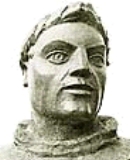The directory «Plots»
Šižgorić Juraj
(1445– ñ. 1509)

Juraj Šižgorić (Georgius Sisgoreus, Sisgoritus) was born in Šibenik on November 13, 1445. He wrote poetry in Latin and was also a humanist. He graduated in Law at the University of Padua. After graduation he returned to his hometown, where he occupied high church officies, replacing frequently absent Bishop of Šibenik. He died in Šibenik, some time around 1509. In a history of Croatian literature he is best remembered as the author of the oldest printed collection of poems Elegiarum et carminum libri tres (Three Books of Elegy and Lyrical Poems, Venice 1477), consisting of 59 poems written by Šižgorić, three poems written by his friends and some fiction texts dedicated to him, one eulogy in praise of Marko Marulić written probably in the mid- 1460 on recomandation of his friend and Marulić’s teacher, Italian humanist Tideo Acciarini. The genre to which his published poems mostly belong are elegy and epistels. During his years of study in Padua he wrote and dedicated some poems to his teachers and to some prominent persons in church hierarchy and secular authority. Motives used in the poems are mostly taken from the ancient history and mithology. For history of literature and contemporary reader some interesting autobiographic accounts: in one of his poems Šižgorić elaborated on a lawsuit and “lost land he inherited from his father”. In his anthological poem „Elegy on the death of two brothers“ („Elegia de duorum obitu fratrum“) he is lamenting a death of his younger brother Jakov (probably a victim of an epidemic) and the other only slightly older, Nikola, age 21, who died defending the country. In the best known poem written by Šižgorić „Elegy on Plundering of a Šibenik Field“ („Elegia de Sibenicensis agri vastatione“), written on the basis of an actual event, the attack of Turks on Šibenik in 1468, for the first time in Croatian literature is applied a paradigmatic and later on a syntagmatic description of the crimes performed by Ottomans (arson and crops destruction, taking people into slavery, rapes, desecrating and destruction of churches). Love topic in Šižgorić’s poems is transmited to reader indirectly, as the experience of poet’s friends. In three published poems, Šižgorić in a liberal manner writes about christian themes (to Virgin Mary, our Lord Creator and Christ). The Christian topics can be found in liturgical lirics of Šižgorić’ manuscript collection of poems, from the year 1487 and published only in 1962; from total of 16 poems written in a sophic strophe, 13 poems are hymns dedicated to the apostles and to St. Paul. In the same year, 1487, Šižgorić completed a historical – geographical tractate/treatise De situ Illyriae et civitate Sibenici (On location of Illyria and about the city of Šibenik, published in 1899). In Chapter 17 the author gives a brief description of Šibenik, Illyria (ancient Illiric and respected individuals among Illyric people (Diokletian, Pope Gaius, St Jerome), Dalmatia and Dalmatians, Dalmatian towns, with special attention paid to Šibenik. The beginning of a text reveals connection between him and antic writers and is of irrelevant literary value. Far more valulable are the last six chapters describing the offshore islands, littoral and the city of Šibenik. Particularly important is the last 17th Chapter „Some thoughts on ancient Šibenik Customs“, mentioning some folk songs (lament, love, pastoral, wedding songs), national dance and Christmas traditions. Interest for a folklore Šižgorić demonstrated in his published pastoral letters written in a form of a poem „A Poem about Trieste Dedicated to Rafael Zovenzoni“, explaining his dream taking place in a pastoral and rustical environment of a littoral town. In the chapter of his tractate De situ Illyriae et civitate Sibenici, Šižgorić mentioned his collection of Illyric proverbs (dicteria) translated into Latin with the assistance of his noble friend Jakov Neplavčić. Unfortunately this priceless collection is lost forever.
Croatia, 2009, Juraj Sizgoric